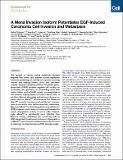A Mena Invasion Isoform Potentiates EGF-Induced Carcinoma Cell Invasion and Metastasis
Author(s)
Philippar, Ulrike; Roussos, Evanthia T.; Oser, Matthew; Yamaguchi, Hideki; Kim, Hyung-Do; Giampieri, Silvia; Wang, Yarong; Goswami, Sumanta; Wyckoff, Jeffrey B.; Sahai, Erik; Condeelis, John S.; Gertler, Frank; Lauffenburger, Douglas A; ... Show more Show less
DownloadGertler_A mena invasion.pdf (2.434Mb)
PUBLISHER_POLICY
Publisher Policy
Article is made available in accordance with the publisher's policy and may be subject to US copyright law. Please refer to the publisher's site for terms of use.
Terms of use
Metadata
Show full item recordAbstract
The spread of cancer during metastatic disease requires that tumor cells subvert normal regulatory networks governing cell motility to invade surrounding tissues and migrate toward blood and lymphatic vessels. Enabled (Ena)/vasodilator-stimulated phosphoprotein (VASP) proteins regulate cell motility by controlling the geometry of assembling actin networks. Mena, an Ena/VASP protein, is upregulated in the invasive subpopulation of breast cancer cells. In addition, Mena is alternately spliced to produce an invasion isoform, Mena[superscript INV]. Here we show that Mena and Mena[superscript INV] promote carcinoma cell motility and invasiveness in vivo and in vitro, and increase lung metastasis. Mena and Mena[superscript INV] potentiate epidermal growth factor (EGF)-induced membrane protrusion and increase the matrix degradation activity of tumor cells. Interestingly, Mena[superscript INV] is significantly more effective than Mena in driving metastases and sensitizing cells to EGF-dependent invasion and protrusion. Upregulation of Mena[superscript INV] could therefore enable tumor cells to invade in response to otherwise benign EGF stimulus levels.
Date issued
2008-12Department
Massachusetts Institute of Technology. Department of Biological Engineering; Massachusetts Institute of Technology. Department of Biology; Koch Institute for Integrative Cancer Research at MITJournal
Developmental Cell
Publisher
Elsevier
Citation
Philippar, Ulrike, Evanthia T. Roussos, Matthew Oser, Hideki Yamaguchi, Hyung-Do Kim, Silvia Giampieri, Yarong Wang, Sumanta Goswami, Jeffrey B. Wyckoff, Douglas A. Lauffenburger Erik Sahai, John S. Condeelis, and Frank Gertler. “A Mena Invasion Isoform Potentiates EGF-Induced Carcinoma Cell Invasion and Metastasis.” Developmental Cell 15, no. 6 (December 9, 2008): 813-828. Copyright © 2008 Elsevier Inc.
Version: Final published version
ISSN
15345807
1878-1551